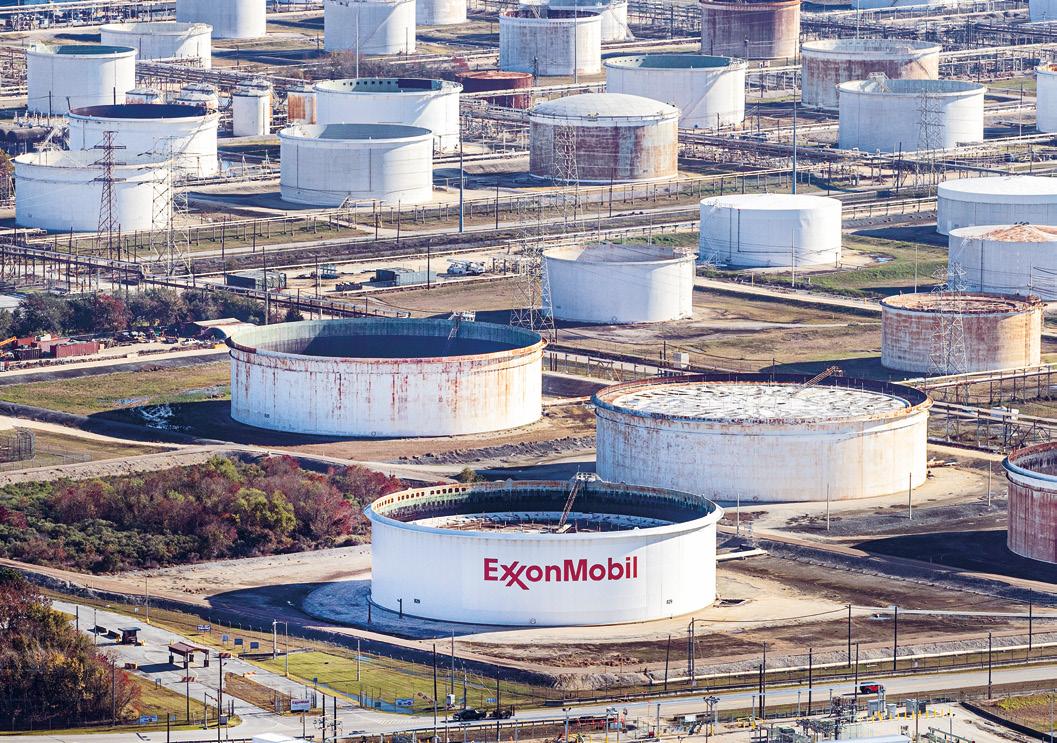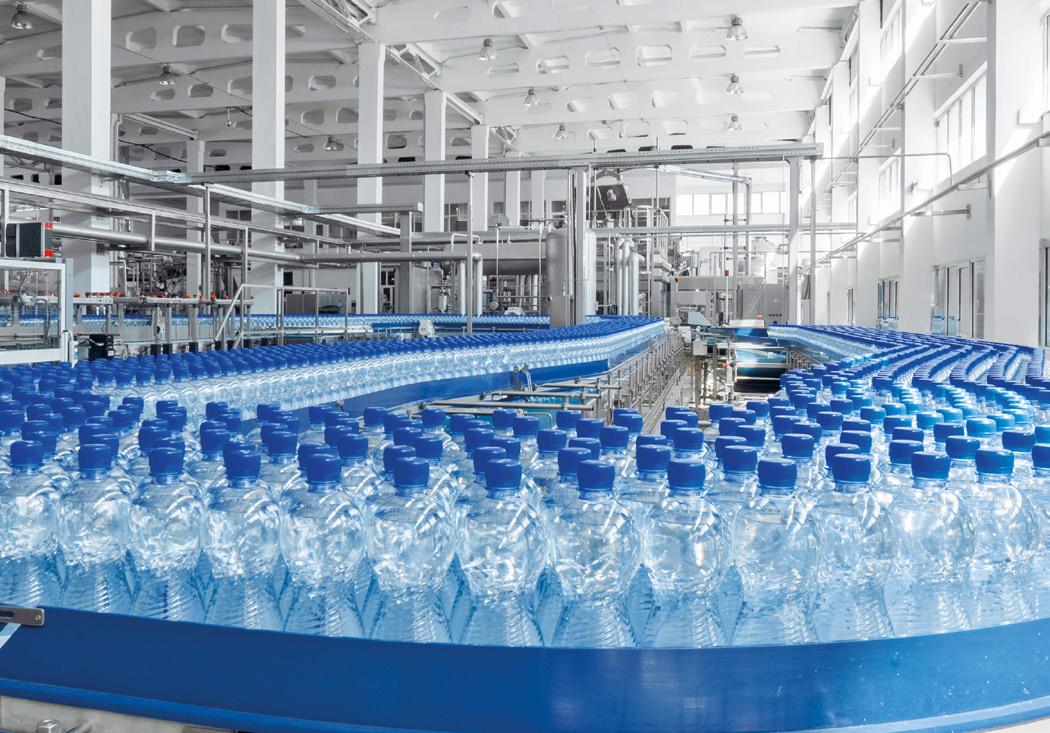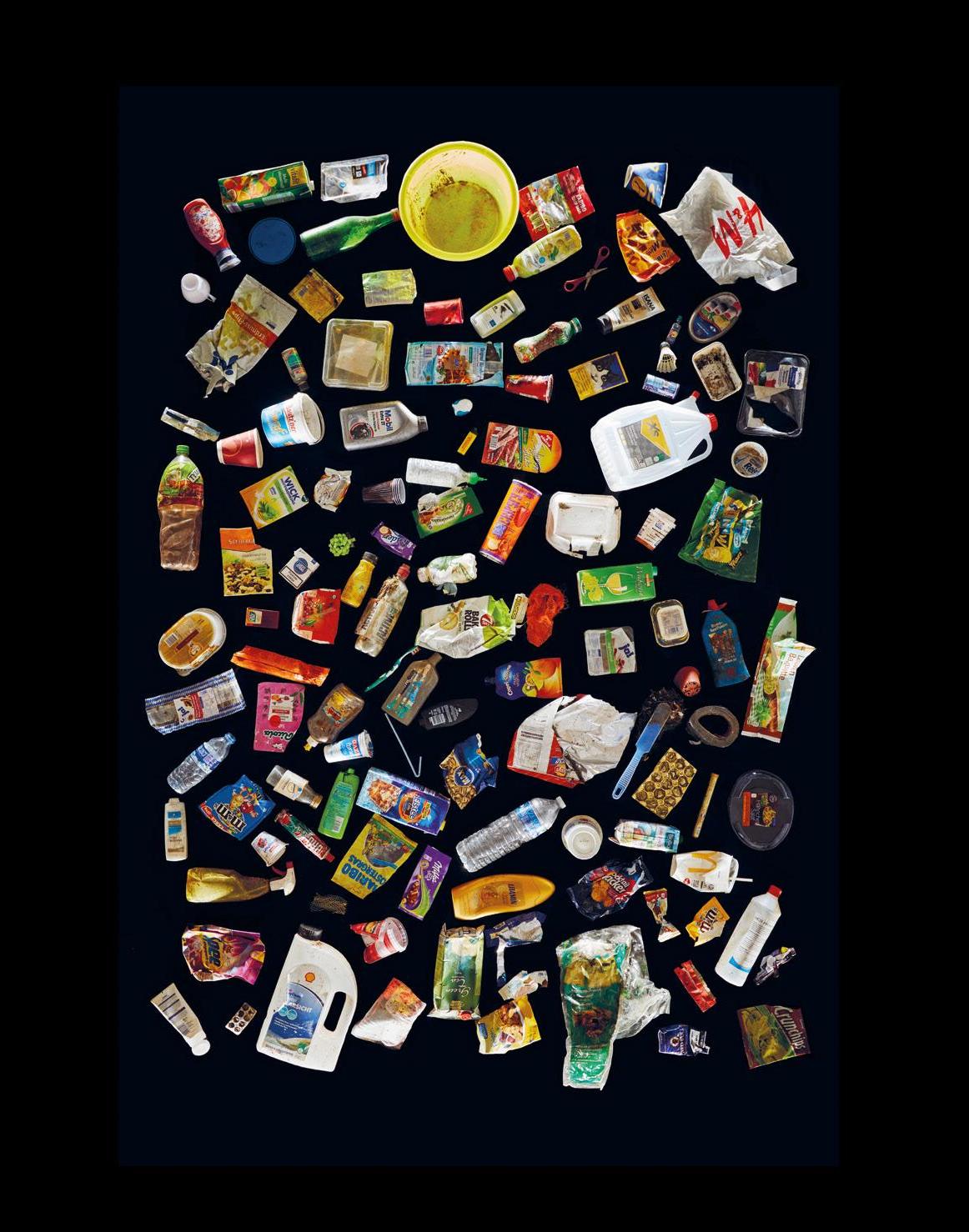
10 minute read
BIG BRANDS PARTNER WITH BIG OIL TO PROFIT ON PLASTIC
BIG BRANDS PARTNER WITH BIG OIL TO PROFIT FROM PLASTICS
Workers on an oil rig owned by Shell. © Greenpeace / Pablo E. Piovano
Advertisement
The plastic supply chain is largely opaque, making it hard to trace an individual single-use plastic package sold by an FMCG company back through the processes of packaging manufacturing, plastic resin production, petrochemical production, and oil and gas extraction, refining and processing. However, establishing supply chain links is made somewhat easier by the fact that many of the world’s largest fossil fuel companies are vertically integrated businesses with significant downstream operations, supplying and processing oil and gas, producing petrochemicals and manufacturing plastic resin – in fact, some of them are among the world’s largest plastic resin producers.
This report looks at the supply chain relationships between nine major FMCG companies responsible for significant amounts of plastic pollution globally, and 12 key resin producers providing the world with plastic resin and packaging. Ten of the resin suppliers are large fossil fuel companies, and only two exclusively make plastic and plastic packaging. At least one analysis suggests that nearly all of the plastic producers profiled here have at least half of their capacity tied directly to plastic packaging.34 To determine which companies to include for this analysis, we reviewed worldwide 2019 plastic resin production capacity, prioritizing polyethylene and polypropylene for their relevance to the plastic packaging market. Of the top 25 plastic resin producers, we examined ExxonMobil (#1 in worldwide capacity), Dow (#2), SABIC (#3, a subsidiary of Saudi Aramco), Ineos (#5), Braskem (#6), Formosa (#8), Total (#12), Indorama (#13), Chevron Phillips Chemical (#15) and Borealis (#22, a subsidiary of OMV).35 Shell36 and Eni37 (through its subsidiary Versalis38) are also key players in the production of single-use plastic packaging.
Despite the FMCG sector’s lack of transparency concerning its plastic supply chains, our investigation revealed plastic supply chain connections between every single FMCG company we researched and at least one major fossil fuel and/or petrochemical company. Coca-
Cola, PepsiCo, Nestlé, Mondelēz, Danone, Unilever, Colgate-Palmolive, Procter & Gamble and Mars all buy packaging from manufacturers supplied with plastic resin or petrochemicals by well-known companies like
ExxonMobil, Shell, Chevron Phillips, Ineos and Dow. All the connections our research identified are shown in the supply chain graphic and in the Appendix.39
To establish these supply chain connections, we consulted detailed import/export records40 and analyzed customer–supplier relationships via the Bloomberg data service.41 We also reviewed publicly available sources, including company annual reports, press releases and websites, and identified plastic manufacturers co-located at FMCG manufacturing facilities.
To understand the nature of the relationships we found and that are presented in this chart, it is helpful to consider the example of PET bottles.

©hassan/Shutterstock
17 December, 2020, Baytown, Texas. Oil storage facilities at ExxonMobil Baytown refinery and petrochemical complex. © Aaron Sprecher / Greenpeace

THE PET BOTTLE
One of the most iconic and familiar plastic packaging materials is polyethylene terephthalate (PET), used for water and soda bottles as well as bottles for shampoo, liquid soap and body wash. For the majority of the nine FMCG companies highlighted in this report, PET represents a large share of their packaging portfolios by weight.42 For example, in 2020, PET made approximately 45% of the total packaging mix used by Coca-Cola43 49% and 27% respectively of the plastic packaging used by Danone,44 and Colgate-Palmolive.45
The use of PET bottles has long been justified by the beverage industry on the grounds that they are more environmentally friendly than other packaging types because of their lower weight, and thus lower transport-related emissions.46 Indeed in the late 1960s, Coca-Cola sponsored the first life-cycle analysis to justify the use of plastic for its soda bottles in light of rising environmental concerns around disposable plastic bottles.47 However, recent analyses suggest that PET is one of the more emissions-intense plastics, second only to polystyrene, when total life-cycle emissions are considered.48
HOW A PET BOTTLE IS MADE
PET is a type of polyester. The two primary raw materials for PET are the petrochemicals monoethylene glycol (MEG), also known as ethylene glycol, and terephthalic acid (TPA) or purified terephthalic acid (PTA).49 TPA/PTA itself is produced from paraxylene (PX), which is produced at oil refineries, generally from naphtha,50 while MEG is produced from ethylene, via the intermediate ethylene oxide.51 PET specifically and polyester more broadly represent a key end use of both TPA/PTA52 and MEG.53 TPA/PTA is reacted with MEG to produce PET resin.54 The resin is heated until molten, then injection-molded into what are known as PET preforms, which can later be blown into plastic bottles. PET resin can also be extruded into sheets that can then be formed into packaging such as cupcake trays and fruit and vegetable containers.
KEY MANUFACTURERS
Key manufacturers of both PET and TPA/PTA include Alpek (notably U.S. subsidiary DAK Americas), Indorama Ventures (IVL) and Nan Ya Plastics (a subsidiary of Formosa). Growth projections indicate that Indorama’s PET capacity could reach 6 million metric tons per year by 2024, nearly double that of its closest competitor Alpek/DAK Americas.55 Ineos Oxide is the largest producer of ethylene oxide and MEG in western Europe.56
PET plastic bottle production conveyor belt. ©Shutterstock

DIFFERENT WAYS OF OPERATING
Some PET producers are integrated, meaning that they produce and market petrochemicals and resin (in the form of chips or pellets), as well as PET preforms, bottles and sometimes finished bottles (with caps and closures). PET producers also sell their PET resin to packaging manufacturers, such as Amcor or Berry Global, 57 that use it to make preforms, bottles, sheets, and rigid PET packaging, which are then sold to FMCG companies. Some beverage companies, however, make their own PET bottles from purchased resin, or blow-mold bottles from purchased preforms. Some large beverage companies even engage a packaging company to set up a bottle manufacturing plant within their production facility (co-location).
Thai-based Indorama is an example of an integrated petrochemical and resin manufacturer; it claims that one in five PET bottles in the world is manufactured from its resins.58 In recent years Indorama has purchased key petrochemical inputs from fossil fuel companies Chevron Phillips (ethylene), ExxonMobil (PX, ethylene), Ineos (ethylene), SABIC (MEG) and Shell (MEG).59 Indorama reportedly secured a long-term contract to purchase ethane and propane feedstock from Targa Resources in 2016, for its hydrocarbon cracking facility (“cracker”) in Louisiana.60 Targa has natural gas fractionation facilities at Mont Belvieu, Texas,61 and owns gas gathering and processing infrastructure across the U.S., including in the Permian Basin, at the heart of the U.S. fracking boom.62 Indorama stated as recently as 2019 that Coca-Cola, PepsiCo and Procter & Gamble were three of its four main customers.63 As of 2018, Nestlé had also been a major customer.64 Indorama’s supplier relationships with CocaCola,65 PepsiCo66 and Nestlé67 have been corroborated in the press and through research by Greenpeace USA.
OTHER PLASTIC PACKAGING
Just as with the PET bottle, almost every type of plastic packaging is the end product of its own multi-stage production process that begins with a fossil fuel – oil, gas or coal. While these processes differ in their details, the overall business relationships are similar. Some of the world’s largest resin producers, such as ExxonMobil, Shell and Chevron Phillips, are vertically integrated fossil fuel/petrochemical companies that make their own petrochemicals from their oil and gas operations – sometimes purchasing additional key inputs from other companies – and then produce and market plastic resin. Some of these companies, including ExxonMobil, produce and market resins specifically designed for particular packaging applications, such as films, wraps and pouches.68 These resins are purchased by packaging manufacturers such as Amcor and Berry Global Group Inc.; such companies are known as “converters,” as they convert the resin into products.
16 January 2017. Plastic waste collected from a river in Germany. © Dennis Reher / Greenpeace

As demonstrated through the public LinkedIn accounts of self-identified current and former ExxonMobil Chemical employees, the company (like some other fossil fuel and petrochemical companies with significant plastic interests) likely has connections with large FMCG companies, including Mars, PepsiCo, and Unilever.69
In our investigation, we also found evidence that some of the FMCG companies on which we focused have received shipments of plastic resin produced by large integrated resin manufacturers. For example, ColgatePalmolive has received shipments of Chevron-branded high-density polyethylene (HDPE) resin from a Chevron distribution division.70
Frequently, however, FMCG companies are supplied by specialist packaging manufacturers without significant upstream interests, among the most notable of which is Amcor. Amcor is a global business manufacturing flexible and rigid packaging, specialty cartons and closures, polyethylene film and bags; the vast majority of its sales are of flexible packaging (accounting for 78% of its revenue in 2020).71 Amcor designs and manufactures flexible packaging for many large FMCG companies, including all nine highlighted in this report: Coca-Cola, Colgate-Palmolive, Danone, Mars, Mondelēz, Nestlé, PepsiCo, Procter & Gamble and Unilever. 72 PepsiCo is one of Amcor’s largest customers: 8% of Amcor’s revenue was attributable to PepsiCo as of July 2021.73 Amcor has a plant co-located with a PepsiCo Gatorade factory in Mountaintop, Pennsylvania,74 and also manufactures PET containers for PepsiCo’s Lipton tea in Central America.75 Amcor and Nestlé have partnered to create recyclable pet food pouches and candy packaging;76 about 5% of Amcor’s revenue is attributable to Nestlé.77 Approximately 1.8% of Amcor’s revenue is attributable to Unilever, 78 with Amcor supplying products such as home laundry packaging to Unilever in India.79 Danone provides about 1.5% of Amcor’s revenue,80 with products including PET yogurt jars for Danone’s La Serenisima brand in Argentina.81 Mondelēz and Amcor have partnered to produce chocolate tray packaging for Mondelēz’s Cadbury brand.82 Amcor’s resin suppliers include ExxonMobil Chemical, Borealis, Alpek/ DAK Americas, Indorama and Dow. 83 Thus, all nine of the consumer goods companies featured in this report have indirect supply chain connections through Amcor to Alpek/ DAK Americas, Borealis, Dow, ExxonMobil and Indorama. Many global shipments of polyethylene and polypropylene films originate at Amcor’s Italy plant, which is adjacent to a large Eni facility.
Berry Global is another major global manufacturer and marketer of plastic packaging products. Berry has claimed to be the largest resin buyer among plastic packaging manufacturers, procuring approximately 3.2 million metric tons of resin annually (mostly polyethylene and polypropylene).84 The company’s suppliers of resin include Total and SABIC, 85 and it has received plastic closures from Shell. 86 Berry also recently entered into a supply agreement with Borealis. 87 Berry’s known customers include Coca-Cola,
Gamble and Unilever. 88
Alpla is a privately owned company headquartered in Austria, and one of the largest packaging producers in Europe. It specializes in blow-molded bottles and caps, injection-molded parts, preforms and tubes. Alpla has received HDPE resin from Braskem and Ineos, and both HDPE and polypropylene from SABIC. 89 Alpla has also received PET from Indorama. 90 Alpla’s known customers include Coca-Cola;91 Colgate-Palmolive;92 Procter & Gamble, for which it produces bottles for Head & Shoulders shampoo with up to 25% “beach plastic”;93 PepsiCo, for which it produces 50% recycled PET bottles;94 and Unilever, for which it makes bottles for Dove bodywash.95 Thus, Coca-Cola, Colgate-Palmolive, PepsiCo, Procter & Gamble and Unilever have indirect supply chain connections via Alpla to Braskem, Indorama, Ineos and SABIC. Similar indirect connections between FMCG and fossil fuel/petrochemical companies were identified via a number of other packaging manufacturers.
The only petrochemical companies included in the graphic for which we found no links with the nine FMCG companies we focused on were Formosa and Eni/Versalis. Given Formosa’s ranking as the sixth-largest chemical company96 and tenth-largest producer of propylene97 in the world, and in view of its operations’ reported health impacts on communities, the lack of supply chain information about the company is particularly concerning.
Unsurprisingly, FMCG companies tend not to
advertise their reliance on the industry that poses
the number one threat to the global climate. This lack of transparency allows FMCG companies to evade accountability for any environmental and human rights violations committed by the companies that supply the plastic or fossil feedstocks for their plastic packaging, and to trumpet climate commitments that ignore their role in enabling the fossil fuel industry’s pivot to expand production of petrochemicals that are used to make plastic.










